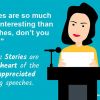-
 +14 +1
+14 +1Wedding Speech Stories You’ll Love to Tell
To help you come up with ideas for your wedding speech, here are some story types that people love to hear. You can come up with stories like these for everyone. Most wedding speeches require two or three stories, so you might want to call on each type of story once.
-
 +15 +1
+15 +1How to write a maid of honor speech – with examples
The bride has just asked you to be the maid of honor and, oh, by the way, would you like to give a speech? No worries – you got this. Here are four examples of successful maid of honor speeches we have written for real weddings.
-
Analysis+12 +1
The new neuroscience of stuttering
After centuries of misunderstanding, research has finally tied the speech disorder to certain genes and brain alterations — and new treatments may be on the horizon
-
 +2 +1
+2 +1A ‘Mic Drop’ on a Theory of Language Evolution
Put your fingertips against your throat and say “abracadabra.” (Don’t whisper; it won’t work. Feign a phone call if you have to.) You should feel a buzzing—that’s your vocal folds vibrating inside your larynx.
-
 +11 +1
+11 +1Human Ancestors May Have Evolved the Physical Ability to Speak More Than 25 Million Years Ago
Speech is part of what makes us uniquely human, but what if our ancestors had the ability to speak millions of years before Homo sapiens even existed?
-
 +10 +1
+10 +1The dawn of speech was millions of years earlier than previously thought
For more than fifty years, scientists have thought that the origin of speech depended on one pivotal moment 200,000 years ago. That’s when the human larynx descended, elongating the vocal tract. Until now, this physiological innovation was seen as the root of humans’ unique ability to communicate verbally with one another. But a new paper suggests that estimate may be off — by a couple of million years.
-
 +22 +1
+22 +1'Exhilarating' implant turns thoughts to speech
The technology could eventually help those who have lost their voice to speak again. By James Gallagher.
-
 +19 +1
+19 +1Why Grown-Ups Keep Talking Like Little Kids
I recently had the honor of meeting an award-winning literary sort, a man wry and restrained and overall quite utterly mature, who casually referred to having gone through a phase in his 20s when he’d been “pilly”—that is, when he’d taken a lot of recreational drugs. The word had a wonderfully childish sound to it, the tacked-on y creating a new adjective in the style of happy, angry, and silly. My writer-acquaintance, I recognized, was not alone in bending language this way.
-
 +15 +1
+15 +1When Silence is a Plea Bargain
On life as a stutterer. By Parker Carroll.
-
 +10 +1
+10 +1Culture affects how people deceive others, study shows: People's language changes when they lie depending on their cultural background.
People's language changes when they lie depending on their cultural background, psychologists have discovered. Linguistic cues to deception do not appear consistently across all cultures. The differences are dictated by known cultural differences in cognition and social norms. This has implications for everything from forensic risk assessments, discrimination proceedings and the evaluation of asylum seekers.
-
 +7 +1
+7 +1The Running Conversation in Your Head
What a close study of "inner speech" reveals about why humans talk to themselves. By Julie Beck.
-
 +24 +1
+24 +1How A Fake British Accent Took Old Hollywood By Storm
The story behind the strange way Katharine Hepburn (and others) spoke. By Dan Nosowitz.
-
 +9 +1
+9 +1Can a Woman’s Voice Ever Be Right?
From the Roman Forum to the 2016 campaign trail, anxiety over what women sound like is part of our cultural DNA. By Jordan Kisner.
Submit a link
Start a discussion




















